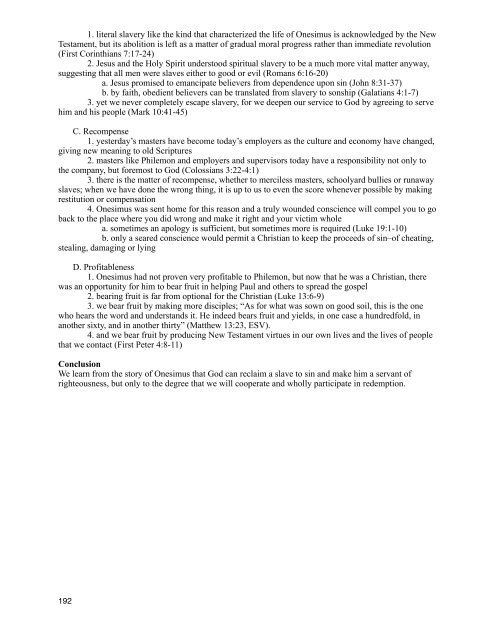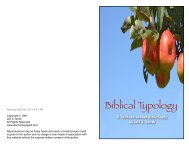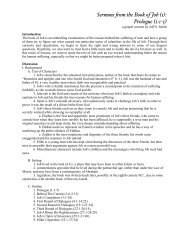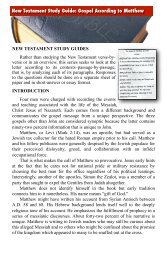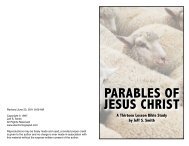Character Studies - ElectronicGospel
Character Studies - ElectronicGospel
Character Studies - ElectronicGospel
- No tags were found...
Create successful ePaper yourself
Turn your PDF publications into a flip-book with our unique Google optimized e-Paper software.
1. literal slavery like the kind that characterized the life of Onesimus is acknowledged by the NewTestament, but its abolition is left as a matter of gradual moral progress rather than immediate revolution(First Corinthians 7:17-24)2. Jesus and the Holy Spirit understood spiritual slavery to be a much more vital matter anyway,suggesting that all men were slaves either to good or evil (Romans 6:16-20)a. Jesus promised to emancipate believers from dependence upon sin (John 8:31-37)b. by faith, obedient believers can be translated from slavery to sonship (Galatians 4:1-7)3. yet we never completely escape slavery, for we deepen our service to God by agreeing to servehim and his people (Mark 10:41-45)C. Recompense1. yesterday’s masters have become today’s employers as the culture and economy have changed,giving new meaning to old Scriptures2. masters like Philemon and employers and supervisors today have a responsibility not only tothe company, but foremost to God (Colossians 3:22-4:1)3. there is the matter of recompense, whether to merciless masters, schoolyard bullies or runawayslaves; when we have done the wrong thing, it is up to us to even the score whenever possible by makingrestitution or compensation4. Onesimus was sent home for this reason and a truly wounded conscience will compel you to goback to the place where you did wrong and make it right and your victim wholea. sometimes an apology is sufficient, but sometimes more is required (Luke 19:1-10)b. only a seared conscience would permit a Christian to keep the proceeds of sin–of cheating,stealing, damaging or lyingD. Profitableness1. Onesimus had not proven very profitable to Philemon, but now that he was a Christian, therewas an opportunity for him to bear fruit in helping Paul and others to spread the gospel2. bearing fruit is far from optional for the Christian (Luke 13:6-9)3. we bear fruit by making more disciples; “As for what was sown on good soil, this is the onewho hears the word and understands it. He indeed bears fruit and yields, in one case a hundredfold, inanother sixty, and in another thirty” (Matthew 13:23, ESV).4. and we bear fruit by producing New Testament virtues in our own lives and the lives of peoplethat we contact (First Peter 4:8-11)ConclusionWe learn from the story of Onesimus that God can reclaim a slave to sin and make him a servant ofrighteousness, but only to the degree that we will cooperate and wholly participate in redemption.192


